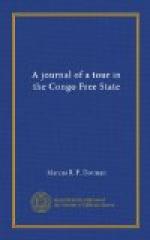[Illustration: YOUNG SANGO GIRLS AT BANZYVILLE.]
It daily becomes more and more obvious that the white man is greatly respected and that his word is absolutely trusted. What he says is true and what he promises, he does. The native appears to respect these characteristics perhaps all the more because he is so lamentably deficient in them himself.
It is indeed the respect caused by moral not physical force which enables a few Europeans to govern this great country with success, and permits one or two white men to live securely with a few soldiers in an isolated Post surrounded by thousands of natives most of whom are savage cannibals.
There are, however, many difficulties yet to be surmounted, and among them is the arrangement of a satisfactory currency. This was brought home forcibly on October 1st when according to weekly custom, the people in the villages around brought in food for the Post. Many women appeared with large bunches of bananas for which as a rule, they are paid by beads. In this prosperous part the heads of the women are already fully adorned with beads and most of their household ornaments also, so they demanded cloth instead.
The question of the currency is a very difficult one. There is the danger of flooding the banks of the Congo with mitakos, and the banks of the Ubangi with beads. In other words these articles which function as money are not used as rapidly as they are supplied, and a lady whose limbs are already weighted with brass rings and whose head is heavy with beads, wishes for some other payment. There is a warehouse at each of the State Posts in which cloth, clothes, beads, salt, and many other commodities likely to be of use to the natives are kept, but it is manifestly impossible to give as wages to each individual the particular object he desires at the particular moment. The objection to beads and mitakos, does not apply to salt and cloth, the former being at once consumed, and the latter being worn out in course of time. Nevertheless it is not well to have a currency which is continually being formed only to be destroyed. The money currency, already existing in the Lower Congo will, however, in course of time be extended, but there are still many difficulties in the way. Francs and centimes will of course be of no use to the natives, unless Stores are still kept at the State Posts at which they can buy whatever they wish. This great question is, however, occupying the careful attention of the Government, and will no doubt be settled as satisfactorily as many others have been which were equally difficult.




